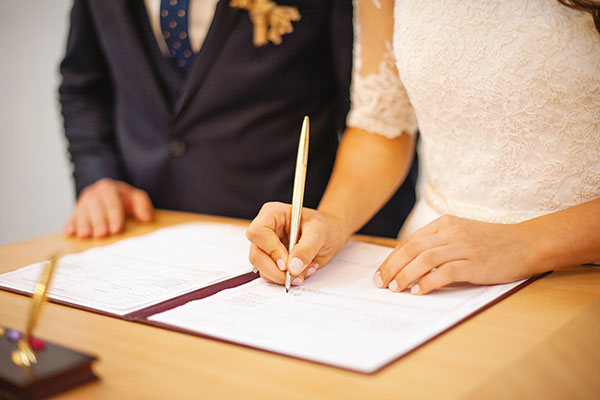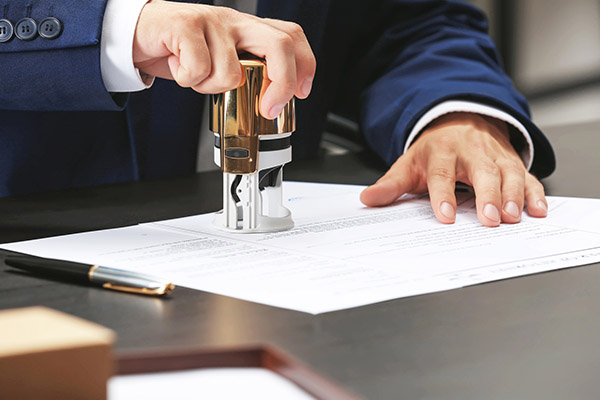An engaged couple has many different options when it comes to choosing a wedding officiant. Of course, ministers, reverends, priests, rabbis, imams, and other religious clergy members regularly marry couples. So do many civil officials and government workers, including judges, magistrates, and justices of the peace. In some jurisdictions, mayors and court clerks can also serve as wedding officiants. Depending on where you live, you can even ask a friend or family member to become ordained and act as your wedding officiant.
With all these possibilities, one officiant option often gets overlooked: the notary public. However, there are many potential benefits to asking a notary to officiate your wedding.
What Is a Notary Wedding?
The term “notary wedding” refers to any marriage ceremony that has a notary public as an officiant. In addition to administering oaths and validating documents, notaries in some states are officially qualified to officiate weddings.
States That Recognize a Notary Wedding
Officiating weddings is something that few states allow notaries to do. Florida, South Carolina, Montana, Nevada, Maine and Tennessee are the only states where a notary public can officiate a wedding. If you’re marrying in any other state, a notary generally can’t officiate. You’d typically have an ordained officiant, a minister, a judge or court official.
In July 2023, Maine changed its original rules. Notaries who wish to officiate marriages must now secure a separate marriage officiant license.
Also in 2023, legislation was proposed in Minnesota and Indiana to allow notaries who are licensed in particular states to register and perform marriages. However in 2024, Indiana released a guideline clearly stating that a notary public cannot perform marriages. In Minnesota, in the absence of a clear directive granting notaries the power to officiate weddings, civil marriages are still governed by the 2024 Minnesota Statutes 517.04, which authorizes judges, court officials, ordained ministers and the residential school superintendents of the Minnesota State Academy for the Deaf and the Minnesota State Academy for the Blind to officiate.
Laws can change, so if you live in these states or plan to marry there, it’s always a good idea to double-check the most current regulations with your county clerk’s office.
Therefore, as of 2025, a notary public has clear authority to serve as a state-recognized wedding officiant in these states only:
- Florida
- South Carolina
- Tennessee
- Montana
- Maine
- Nevada (still requires its notaries to secure a Certificate of Permission to Solemnize Marriages from the local county clerk)
Can I Have a Notary Wedding If I Don’t Live in One of Those States?
Yes, you do not need to be a resident to have a notary public officiate your wedding in any of these six states. Nevada, especially Las Vegas, and Florida are the most popular choices for notary weddings, thanks to their easier processes and great tourism infrastructure that caters to traveling couples and their guests.
To make your notary wedding a breeze, just remember a few key considerations:
- Marriage License: Obtain a marriage license directly from the county where your ceremony will be held. Your license is only valid within that state.
- Local Law Variations: Keep in mind that specific requirements for things like fees, documentation and waiting periods can vary slightly from one county to the other.
- Notary Marriage Witnesses: Be aware that some states may require one or two witnesses to be present at your ceremony.
- Marriage License Expiration Date: Your marriage license will have an expiration date (often 30-90 days), so be sure to plan your travel and wedding date accordingly.
However, please also note that these notaries are uniquely permitted to officiate weddings in their specific state of commission. For example, a Florida notary is not permitted to travel to another state to marry a couple. It is also important to note that a notary’s Remote Online Notarization (RON) powers do not extend to officiating weddings anywhere in the United States.
The Notary Wedding Process
Before the Wedding
Verify Legality: Call the county clerk where you’ll marry to confirm a notary can officiate and to learn about witness requirements and filing deadlines.
Get Your License: Apply for your marriage license with valid IDs. Be aware of any fees, waiting periods and the license’s expiration date. Both members of the couple seeking to be wed must be present for this.
Choose Your Notary: Hire a notary with an active commission for the state. Get a written agreement covering fees, travel and the scope of the ceremony.
Prepare Documents: If previously married, have proof of divorce or a death certificate ready.
Your Wedding Day
Bring Your Essentials: On the day, bring the marriage license packet, your government IDs and any required witnesses.
Sign With Care: Before signing, carefully review all names and dates for accuracy.
After the Wedding
File On Time: Ensure the signed license is returned to the clerk’s office within the required window.
Order Certified Copies: Request 2-3 certified copies of your marriage certificate for name changes and other official updates.
Update Records: Once you have your certified copy, update your name with Social Security, the DMV, banks and your employer.
The other steps in the notary wedding process are very similar to those for any wedding in your state (e.g., choosing a venue, inviting wedding guests, and incorporating personal touches).
The Legal Considerations of a Notary Wedding
Beyond making sure that your state allows notaries to officiate weddings, you must select a notary with a current appointment in that state. If your chosen notary has a lapsed commission, your wedding will not be legally valid.
Other legal considerations are common to all types of wedding but might vary from state to state. For example, some states require witnesses, and some don’t. Furthermore, some require couples to sign the marriage license before the ceremony, while others require couples to sign the marriage license after the ceremony. You must also ensure that both you and your fiancé meet the general requirements to marry each other in your state.
The Pros and Cons of a Notary Wedding
While notary weddings might encounter venue restrictions and come with limited ceremonial options, they can meet the specific wants and needs of a wide range of couples. If you are looking for a relatively simple and straightforward wedding that is flexible, affordable and generally free of religious trappings, a notary wedding might be right for you!
Need a Signing Today?
First Class Signing Service’s home office is in Livermore, California, but we pride ourselves on delivering all-in signing solutions to clients nationwide, covering all 50 states and four U.S. territories.
What sets us apart is our exceptional team of 50,000-plus highly qualified signing agents who are dedicated to providing reliable and efficient signing services with utmost care and professionalism.





